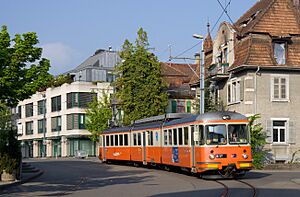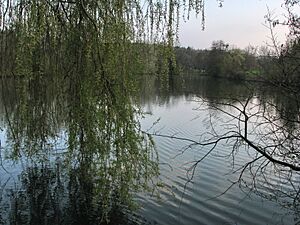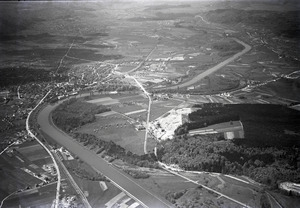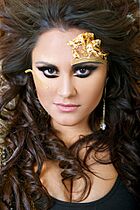Dietikon facts for kids
Quick facts for kids
Dietikon
|
||
|---|---|---|
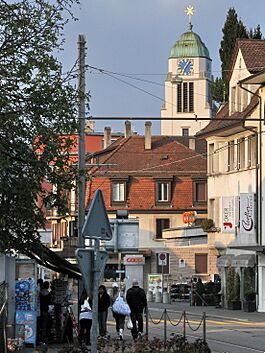 |
||
|
||
| Country | Switzerland | |
| Canton | Zurich | |
| District | Dietikon | |
| Area | ||
| • Total | 9.34 km2 (3.61 sq mi) | |
| Elevation | 388 m (1,273 ft) | |
| Population
(Dec 2020 )
|
||
| • Total | 28,057 | |
| • Density | 3,004.0/km2 (7,780/sq mi) | |
| Postal code |
8953
|
|
| Surrounded by | Bergdietikon (AG), Geroldswil, Oetwil an der Limmat, Schlieren, Spreitenbach (AG), Unterengstringen, Urdorf, Weiningen | |
| Twin towns | Kolín (Czech Republic), Braggio (Switzerland), Renens (Switzerland) | |
Dietikon is a lively city in Switzerland, located in the canton of Zürich. It's the fifth largest city in this canton, after bigger places like Zürich and Winterthur. Dietikon is also the main town of its own district and is part of the larger Zürich area.
Contents
Exploring Dietikon's Geography
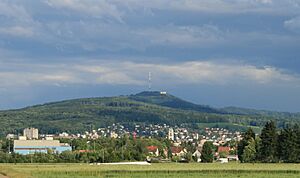
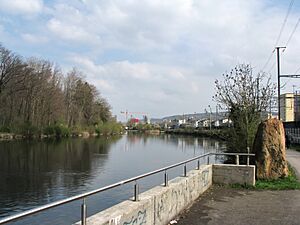
Dietikon is an industrial city located about 388 meters (1,273 feet) above sea level. It sits where two rivers, the Reppisch and the Limmat, meet. This area is known as the Limmat Valley (Limmattal in German).
The city is along the railway line that connects Zürich to Baden. You can also find a large train yard nearby, which is used for sorting freight trains.
Dietikon covers an area of about 9.3 square kilometers (3.6 square miles). A big part of this land, almost half, is used for buildings and roads. Forests cover about 27% of the area, and 17% is used for farming.
Forests and Nature
Dietikon has several well-known forests, including Honeret, Guggenbüehl, and Röhrenmoos.
The Honeret forest is special because it has over 200 large stones scattered throughout. Some of these are huge, like erratic boulders, which are rocks moved by ancient glaciers. This forest also has springs that feed into small streams.
The Guggenbüehl forest is entirely within Dietikon. It has a pond called "Giigelibode" that doesn't have any rivers flowing into or out of it. There's also a fitness trail in this forest, which is great for outdoor exercise.
Getting Around Dietikon
Dietikon is easy to reach by car, as it's located right on the A3 motorway.
For train travel, Dietikon has two railway stations: Dietikon railway station and Glanzenberg railway station. These stations are part of the S-Bahn Zürich network, serving lines S3 and S12. Dietikon railway station is also the end stop for the S17 line, which is run by the Bremgarten-Dietikon-Bahn.
In the past, from 1900 to 1928, Dietikon was the last stop for a tram line from Zürich. Today, a new light rail line, the Limmattal light rail line, follows a similar path and goes even further, connecting Dietikon to Killwangen.
Rivers and Ponds in Dietikon
The main rivers flowing through Dietikon are the Limmat and its smaller branch, the Reppisch. There are also two important brooks, the Schäflibach and the Teischlibach, both about 3 kilometers (1.9 miles) long.
The Schäflibach is formed when two other streams, Allmendbach and Stockacherbach, join together. It then flows into the Limmat river. The Teischlibach starts in the Röhrenmoos forest, high above Dietikon, and also flows into the Limmat.
You can find the Marmoriweiher pond in an area called Grunschen, which is a popular spot for games and barbecues. The Marmoriweiher is an artificial pond. It was originally built to provide water for the fire brigade. Later, a marble factory used its water, which is how it got its name.
A Glimpse into Dietikon's History
Dietikon was first mentioned in historical records around the year 1100. The name was written as Dietinchovin back then.
The city has some old Roman ruins. It's also home to the Fahr Benedictine Convent, which was established around 1130 AD. The church at the convent was built much later, between 1743 and 1746.
A famous battle, the Second Battle of Zürich, took place in Dietikon in September 1799. Because of this important event, Dietikon's name is carved onto a pillar at the Arc de Triomphe in Paris, France.
Economy and Learning in Dietikon
Dietikon is home to several businesses. For example, the local newspaper, Limmattaler Zeitung, is based here. Also, Ex Libris, a well-known bookshop chain, has its offices in Dietikon.
Weather in Dietikon
Dietikon experiences about 132 days of rain each year. On average, the city receives about 1,078 millimeters (42.4 inches) of rain annually. August is usually the wettest month, with about 114 millimeters (4.5 inches) of rain over roughly 12.7 days.
Fun Places to Visit in Dietikon
Dietikon offers some interesting places to explore:
- Bruno Weber Park: This is a unique sculpture garden and a complete work of art located near Dietikon and Spreitenbach. It's one of the few places like it in Switzerland.
- Glanzenberg Castle Ruins: Glanzenberg was once a settlement along the Limmat river. Its defenses were never fully finished, and it might have been destroyed around 1267 or 1268, according to old stories. You can find the remains of the castle walls in a small forest near the Glanzenberg train station. The Counts of Regensberg built this castle in the late 12th century AD.
Famous People from Dietikon
Many interesting people have connections to Dietikon:
- Bruno Weber (1931-2011): An artist and architect known for his amazing "fantastic realism" style.
- Peter Schweri (1939-2016): An artist who was a painter, illustrator, photographer, and even a music composer.
- Peter Vetsch (born 1943): An architect famous for designing and building unique earth houses.
- Urs Fischbacher (born 1959): An economist and professor who studies how people make economic decisions.
- Markus Notter (born 1960): A politician who used to be the city president.
- Josef Wiederkehr (born 1970): A businessman and politician.
- Diamá (born 1980): Also known as Claudia D'Addio, a singer who grew up in Dietikon.
Dietikon's Sister Cities
Dietikon has special partnerships with other towns, called twin towns:
 Braggio, in the Graubünden canton of Switzerland
Braggio, in the Graubünden canton of Switzerland Kolín, in the Czech Republic
Kolín, in the Czech Republic Renens, in the Vaud canton of Switzerland
Renens, in the Vaud canton of Switzerland
Gallery
-
Dietikon's name on the Arc de Triomphe in Paris, remembering the Second Battle of Zürich in 1799
See also
 In Spanish: Dietikon para niños
In Spanish: Dietikon para niños
 | Delilah Pierce |
 | Gordon Parks |
 | Augusta Savage |
 | Charles Ethan Porter |





